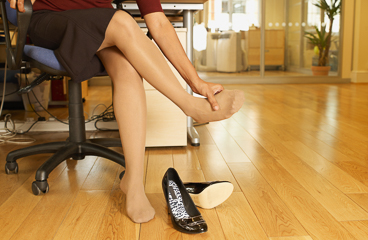
What is neuropathy?
Chemotherapy, or chemo, can cause damage to the nerves. This damage is called peripheral neuropathy (say "puh-RIFF-uh-rul noo-RAW-puh-thee"). It can affect the nerves that control your sense of touch, how you feel pain and temperature, and your muscle strength.
What are the symptoms?
Some common symptoms of neuropathy are:
- Numbness, tightness, and tingling. This usually starts in the fingers and toes.
- Loss of feeling.
- Burning, shooting, or stabbing pain in the legs, hands, and feet. Often the pain is worse at night.
- Weakness and loss of balance.
- A change in how sensitive you are to touch or temperature. You may sense them more or less than normal.
- Bowel problems, such as constipation.
Neuropathy from chemo usually builds slowly over a few months. You may have your worst symptoms right after a chemo treatment. Then they may improve a bit until the next treatment.
After you finish chemo, your symptoms may improve or go away. This may take as much as a year or more. In some cases, some of the nerve damage may be permanent.
How is neuropathy treated?
For treating pain, there is no single treatment that works for everyone. You and your doctor may want to try different things.
- Your doctor may recommend medicines. These include medicines that can help with nerve pain. They include certain kinds of antidepressants, such as duloxetine or amitriptyline, and certain kinds of antiseizure medicine, such as gabapentin.
- Be safe with medicines. Take your medicines exactly as prescribed. Call your doctor if you think you are having a problem with your medicine.
- You may try therapies such as acupuncture, physical therapy, and transcutaneous electrical nerve stimulation (TENS). And you can try relaxation techniques such as deep breathing.
Tell your doctor right away about any new or changing symptoms during chemo. Your doctor may be able to change your chemo treatment to help prevent nerve damage.
How can you care for yourself at home?
Avoiding injury
Be careful to avoid injury.
- When your feet or legs feel numb, it's easier to lose your balance and fall. Try to avoid walking on uneven surfaces. At home:
- Keep floors and stairs clear of throw rugs and clutter.
- Install sturdy handrails on stairways.
- Put grab bars near your shower, bathtub, and toilet.
- If you need one, use a cane, walker, or wheelchair.
- To avoid burning yourself:
- Use pot holders.
- Avoid hot water and steam when you cook.
- Always check water from a hot faucet or shower using a part of your body that can feel temperature normally, such as your elbow.
- Check your feet, legs, hands, and arms every day for skin and nail problems that can get worse without your feeling them. If you need to, have someone else check for you.
- Look at all parts of your feet. Be sure to check your toes.
- If needed, use a handheld mirror to inspect your feet. Or you can attach a magnifying mirror to the bathroom wall near the baseboard.
- Avoid walking with bare feet if they are affected.
- Try wearing gloves to protect your hands when you work outside.
Healthy lifestyle
Eat a balanced diet. Also, avoid alcohol and smoking. They can make neuropathy worse.
Follow-up care is a key part of your treatment and safety. Be sure to make and go to all appointments, and call your doctor if you are having problems. It's also a good idea to know your test results and keep a list of the medicines you take.
Where can you learn more?
Go to http://www.healthwise.net/patientEd
Enter E931 in the search box to learn more about "Learning About Neuropathy From Chemotherapy".
Current as of: December 3, 2024
Author: Ignite Healthwise, LLC Staff
Clinical Review Board
All Ignite Healthwise, LLC education is reviewed by a team that includes physicians, nurses, advanced practitioners, registered dieticians, and other healthcare professionals.

